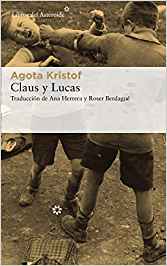Sometimes circumstances conspire to create something unique out of inconvenience or adversity.
In the case of Kristof exhausts everything came together so that she did not write this volume of three novels in the foreign language that received her on her flight from the new Hungary administered secretly by the USSR.
The same paradox of destiny would unload on its characters, the brothers Claus and Lucas, all the insurmountable oppositions for some children of war.
Adverse circumstances that created a special synergy on both sides of the mirror of reality and fiction. Especially when a realism like the one related in this volume recovered for the cause of the great classic works is approached.
What embodies everything, what makes the story told and the particular circumstances of Agota come together in the transcendental, is language. In the absence of more resources, the author displays her ingenuity with a conciseness that fits perfectly with the vision of the world of the boys and their meager ability to communicate.
One of the great dangers of any narrative is to put terms or even impossible dialogues between characters who cannot function in what areas. Something like writing a novel with children's characters in which one of them observes: This wonderful sunset, saturated with reddish colors, makes me consider the mysterious splendor of the meaning of life….
In this play the boys talk exactly as they are. And in that precise adaptation the harshness of the circumstances ends up shining, the improvised inventiveness towards survival. The capacity of the most gifted with emotional intelligence, from childhood, makes its way through the rubble of a society made rubble even morally.
Claus and Lucas are two orphaned boys, who analyzing the experiences of Agota can manifest as reflections of the feelings of the stateless author. Their existence is the drama of the time that they have had to live in the middle of a war that has their country dominated by foreign forces. Throughout the three divisions of the work:
The best thing about the story is how everything takes on a very special meaning depending on the plane from which it is viewed. Violence born of scarcity, or uprooting and abandonment, passing through the consideration of twins as two extremely evil beings. Are we the ones to judge them?
From the feeling of rejection, a bitter idea ends up that circumstances rule. Beyond the particular relationship between the boys when they spend everything together, or when one decides to stay and another to leave, in the third part "The great lie" ends up stripping everything, seeking that our own focus on what is narrated ends up complementing the story , splashing ourselves, getting involved, trying to get us to put ourselves in each other's place in search of an impossible synthesis about an always subjective truth that ends up being that great lie.
You can now buy the novel Claus and Lucas, the great book by Agota Kristof, here:

